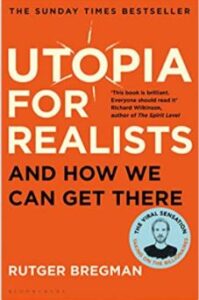 In his book Can we be happier?, Richard Layard advocates that the central driving principle of mankind should be to maximise the total happiness experienced by all individuals across a society.
In his book Can we be happier?, Richard Layard advocates that the central driving principle of mankind should be to maximise the total happiness experienced by all individuals across a society.
It represents a brave attempt by a trained economist to advocate that governments change the objective of maximising GDP growth to one of looking to improve the health, wealth and quality of life of its citizens as measured by their happiness.
I don’t think the author does any favours to his idea by using the term happiness. Happiness conjures images of silliness, unthinking behaviour and short-term enjoyment. This is not what he means. In the book happiness is measured by asking people how satisfied they are with their life. Life-satisfaction, in my view is quite a different concept, in implies a contentment with one’s position in the world. The book should be retitled Can we be more satisfied with our lives?
He says:
The challenge to development economists is clear. Grinding poverty has to be eliminated. It destroys happiness and shortens lives. But it is wrong to go helter-skelter for growth. What is needed is a deliberate process whereby genuine communities are maintained or created – communities which give people the feeling of belonging and purpose.
All this is true but this will not be achieved by focussing solely on life-satisfaction. The measurement is unaspirational, unaccepting of change and self -centred. I believe a better measure of human progress is life-fulfilment.
To quote from Compete or Co-operate:
I believe there are two aims for human society that most of us can support. The first is for as many people as possible to live a sufficiently healthy and safe existence that they can achieve life fulfilling roles in their communities. The second is to achieve an ecologically stable presence on Earth, one in which the future of humanity is secure and the natural world is protected. The pursuit of life fulfilment is a specifically human objective. It is an expression of the human requirement to have purpose and meaning in life. All humans need recognition and praise for their achievements, however small they may be. Life-fulfilment can be as elemental as bringing up a family, but it also can be gained by work, participating in sport, and providing support to others in the community. Its outcome is directly related to the needs of society as a whole and not necessarily based on material reward or personal self-gratification.
Concentrating on maximising happiness alone will not be enough to create a successful society.

 These days the left seems to have forgotten the art of Politics. Worse , many left -wing thinkers and politicians attempt to quell radical sentiments among their own rank and file in their terror of losing votes. This attitude is one I’ve begun to think of in recent years as the phenomenon of ‘underdog socialism’. . Sadly, the underdog socialist has forgotten that the story of the left ought to be a narrative of hope and progress.
These days the left seems to have forgotten the art of Politics. Worse , many left -wing thinkers and politicians attempt to quell radical sentiments among their own rank and file in their terror of losing votes. This attitude is one I’ve begun to think of in recent years as the phenomenon of ‘underdog socialism’. . Sadly, the underdog socialist has forgotten that the story of the left ought to be a narrative of hope and progress. Tax havens allow the rich and multi-nationals to avoid paying taxes, and crooks and corrupt politicians to hide their ill-gotten gains. They are pernicious regulatory authorities which act against the interests of tax payers everywhere. In any rational world, countries would co-operate to ensure they were not allowed to operate. The fact they exist at all signifies the degree to which the rich and multi-nationals have manage to subvert the democratic process.
Tax havens allow the rich and multi-nationals to avoid paying taxes, and crooks and corrupt politicians to hide their ill-gotten gains. They are pernicious regulatory authorities which act against the interests of tax payers everywhere. In any rational world, countries would co-operate to ensure they were not allowed to operate. The fact they exist at all signifies the degree to which the rich and multi-nationals have manage to subvert the democratic process. GDP growth isn’t the only objective for society, though sometimes it seems to be the only measure of success that all our politicians endorse. There are arguably other more relevant measures of a nation’s success. This week the UK’s Office of National Statistics published its figures on life expectancy for 2015 to 2017; it shows that life expectancy in the UK is 79 years for men and 83 years for women.
GDP growth isn’t the only objective for society, though sometimes it seems to be the only measure of success that all our politicians endorse. There are arguably other more relevant measures of a nation’s success. This week the UK’s Office of National Statistics published its figures on life expectancy for 2015 to 2017; it shows that life expectancy in the UK is 79 years for men and 83 years for women.